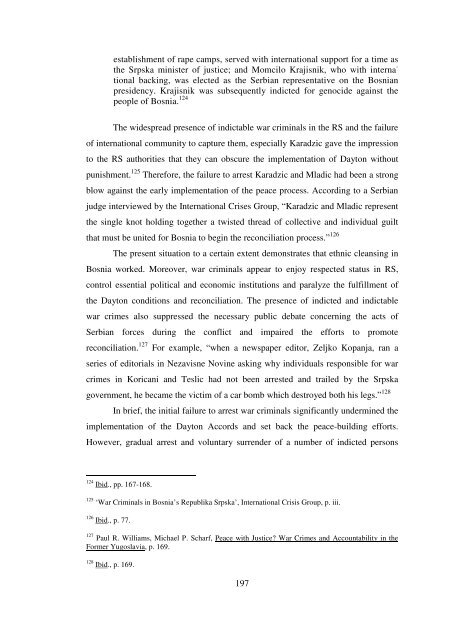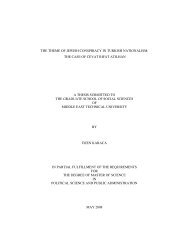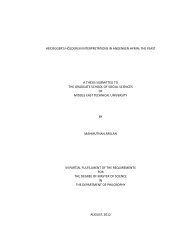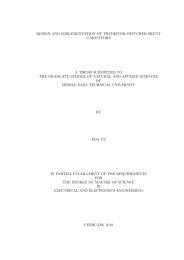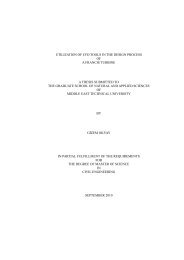- Page 1 and 2:
PEACE BUILDING AFTER HUMANITARIAN I
- Page 3 and 4:
PLAGIARISM I hereby declare that al
- Page 5 and 6:
Failure of institutionalization of
- Page 7 and 8:
aşarısızlığını ortaya çıka
- Page 9 and 10:
ACKNOWLEDGEMENTS I express sincere
- Page 11 and 12:
2.5.2 Lack of Commitment...........
- Page 13 and 14:
7 LESSONS LEARNT AND NOT LEARNT FRO
- Page 15 and 16:
CHAPTER 1 INTRODUCTION Peace buildi
- Page 17 and 18:
shortcomings of the various instrum
- Page 19 and 20:
consensus on the probability that r
- Page 21 and 22:
Some work undertakes merely the ret
- Page 23 and 24:
and International Crises Group, whi
- Page 25 and 26:
continues to the implementation of
- Page 27 and 28:
concept and make its place in inter
- Page 29 and 30:
Since there is no specific referenc
- Page 31 and 32:
include measures to avoid its repet
- Page 33 and 34:
which is a “vague operational tar
- Page 35 and 36:
time.” 27 Subsequently, the usual
- Page 37 and 38:
In general, main objective of peace
- Page 39 and 40:
2. 4.1 Governance Reform Internal c
- Page 41 and 42:
the former combatants are very impo
- Page 43 and 44:
nature of the interim institutions
- Page 45 and 46:
een used as an indicator of re-esta
- Page 47 and 48:
established by a number of peace ac
- Page 49 and 50:
2.5.2 Lack of Commitment The concep
- Page 51 and 52:
paralyzing the rebuilding efforts o
- Page 53 and 54:
subject to structural reforms as in
- Page 55 and 56:
the entire basket of postwar needs,
- Page 57 and 58:
CHAPTER 3 INTERVENTION FOR PEACE: T
- Page 59 and 60:
When the European Community (EC) re
- Page 61 and 62:
cleansing defined manifestly as the
- Page 63 and 64:
need to distinguish who is the aggr
- Page 65 and 66:
forces.” 33 One month later, five
- Page 67 and 68:
policing. The central government of
- Page 69 and 70:
In sum, the main changes from the f
- Page 71 and 72:
and the necessity for the long-term
- Page 73 and 74:
their full compliance, to coordinat
- Page 75 and 76:
in Bosnia and Herzegovina are the o
- Page 77 and 78:
incorporate Annex 2 and 3 which are
- Page 79 and 80:
enforce order, arrest war criminals
- Page 81 and 82:
Accords gave the Office of the High
- Page 83 and 84:
epresentatives, economic sanctions
- Page 85 and 86:
needed by the State budget. The Par
- Page 87 and 88:
Presidency can claim a decision to
- Page 89 and 90:
and the wide-ranging autonomy of th
- Page 91 and 92:
4.1.1.1 Constitutional Reforms The
- Page 93 and 94:
considered as minority while in the
- Page 95 and 96:
to find the complete and amended te
- Page 97 and 98:
Society Program many local NGOs wer
- Page 99 and 100:
Bosnia and Herzegovina needs is not
- Page 101 and 102:
effective and legitimate forms of g
- Page 103 and 104:
peace. 86 This lead to the establis
- Page 105 and 106:
environment” and the presence of
- Page 107 and 108:
eason that NATO works merely with s
- Page 109 and 110:
to do with the real security situat
- Page 111:
New York, IPTF officers complained
- Page 114 and 115:
European and international practice
- Page 116 and 117:
In sum, IPTF was mandated by UN Sec
- Page 118 and 119:
Contrary to most other states, the
- Page 120 and 121:
Judicial Commission (IJC) in March
- Page 122 and 123:
CHAPTER 5 IMPLEMENTATION OF DAYTON
- Page 124 and 125:
Rulings of the PEC superseded pre-e
- Page 126 and 127:
societies, the integrative capacity
- Page 128 and 129:
Since the establishment of Bosnian
- Page 130 and 131:
those who had lower stance during t
- Page 132 and 133:
The party generally works together
- Page 134 and 135:
and constitutional dilemmas after r
- Page 136 and 137:
long process of reconciliation and
- Page 138 and 139:
the SDS and her closest opponent wa
- Page 140 and 141:
Source: Organization for Security a
- Page 142 and 143:
person.” 81 It is clear that most
- Page 144 and 145:
Number of voters who cast ballots 2
- Page 146 and 147:
to change the political scene.” 1
- Page 148 and 149:
the expense of larger parties altho
- Page 150 and 151:
parties.” 123 However, the succes
- Page 152 and 153:
each other. 128 “If Bosnia is to
- Page 154 and 155:
Declaration of the Peace Implementa
- Page 156 and 157:
The new Election Law 143 of BiH end
- Page 158 and 159:
However, the OSCE election experts
- Page 160 and 161: electoral process which, while in l
- Page 162 and 163: gave advantage to the ethnic partie
- Page 164 and 165: government’s failure enabled the
- Page 166 and 167: Stability Initiative Report, 22 Mar
- Page 168 and 169: een eradicated in BiH national part
- Page 170 and 171: take part in the election campaigns
- Page 172 and 173: contributed to keep nationalist pol
- Page 174 and 175: Civil society building becomes a pr
- Page 176 and 177: question the role international com
- Page 178 and 179: international personnel can do a li
- Page 180 and 181: of the foreign donors. Although fro
- Page 182 and 183: From a more technical point of view
- Page 184 and 185: to be the “second after the Nazi
- Page 186 and 187: mechanism to address human rights v
- Page 188 and 189: functioned similar to the European
- Page 190 and 191: standing of the parties, which was
- Page 192 and 193: (MHRR) to this end. The MHRR as a c
- Page 194 and 195: whose office in Bosnia is responsib
- Page 196 and 197: contributions for pension and healt
- Page 198 and 199: Additionally, as part of the larges
- Page 200 and 201: uilding. 73 Therefore, the majority
- Page 202 and 203: justice in peace building process,
- Page 204 and 205: of cooperation with international c
- Page 206 and 207: wait for the trail. This policy pro
- Page 208 and 209: information gathered by the Bosnian
- Page 212 and 213: improved the level of Dayton implem
- Page 214 and 215: will definitely influence the succe
- Page 216 and 217: For this end, the OSCE started to c
- Page 218 and 219: Croat history books. Nevertheless,
- Page 220 and 221: Herzegovina. 168 In this respect, A
- Page 222 and 223: Moreover, the organization works to
- Page 224 and 225: seeking to return to their pre-war
- Page 226 and 227: operation in management and the imp
- Page 228 and 229: first years of Dayton implementatio
- Page 230 and 231: and political control as well as fo
- Page 232 and 233: “682,365 persons, of 74% of the t
- Page 234 and 235: Table 9: Returns Summary to BiH fro
- Page 236 and 237: There has been a hostile environmen
- Page 238 and 239: country was mine infected, or that
- Page 240 and 241: ensure successful refugee return, r
- Page 242 and 243: utilities and health care and repre
- Page 244 and 245: The progress especially in the Repu
- Page 246 and 247: activities towards the full impleme
- Page 248 and 249: persons, refugees and returnees. Ne
- Page 250 and 251: Returnees should be assured the sam
- Page 252 and 253: the various international instituti
- Page 254 and 255: contaminated by institutional pride
- Page 256 and 257: CHAPTER 7 LESSONS LEARNT AND NOT LE
- Page 258 and 259: 1990 that operated with no trouble.
- Page 260 and 261:
7.2 Rambouillet Accords and the Imp
- Page 262 and 263:
the KLA and the Yugoslav government
- Page 264 and 265:
Reconstruction UNMIK Administration
- Page 266 and 267:
General sought to establish a clear
- Page 268 and 269:
more limited especially in the begi
- Page 270 and 271:
plan in December 2003 conditioning
- Page 272 and 273:
Serb military and police forces.’
- Page 274 and 275:
directly to support the UN mission.
- Page 276 and 277:
7.4.2.3 Judicial Reform One of the
- Page 278 and 279:
“security environment on the grou
- Page 280 and 281:
of Bosnia moderate forces have been
- Page 282 and 283:
once the issue of human rights in a
- Page 284 and 285:
ethnic violence and crimes committe
- Page 286 and 287:
on Education and Youth and UNMIK De
- Page 288 and 289:
The UNSCR 1244 gave the responsibil
- Page 290 and 291:
international body for the resoluti
- Page 292 and 293:
authorities needs to be re-examined
- Page 294 and 295:
field. 196 The wider implications o
- Page 296 and 297:
community and the UN ever.” 206 Y
- Page 298 and 299:
CHAPTER 8 CONCLUSION Peace building
- Page 300 and 301:
At this point, the peace building p
- Page 302 and 303:
institutions as well as implement t
- Page 304 and 305:
Nevertheless, the local police coul
- Page 306 and 307:
instruments provide standards for t
- Page 308 and 309:
dissertation found out that returne
- Page 310 and 311:
Moreover, the same instruments of p
- Page 312 and 313:
Bergling, Per, ‘Judicial Reform u
- Page 314 and 315:
Demichelis, Julia, ‘NGOs and Peac
- Page 316 and 317:
Democracy and Human Rights in Multi
- Page 318 and 319:
International Crisis Group, ‘Koso
- Page 320 and 321:
OHR, ‘Decision on the Establishme
- Page 322 and 323:
Putnam, Tonya L., ‘Human Rights a
- Page 324 and 325:
UN, ‘S.C. Res. 781’, U.N. SCOR,
- Page 326 and 327:
APPENDICIES APPENDIX A DAYTON PEACE
- Page 328 and 329:
This Agreement shall enter into for
- Page 330 and 331:
Parties shall respond to alleged vi
- Page 332 and 333:
d. The Parties immediately after th
- Page 334 and 335:
Fire Zone of Separation which are f
- Page 336 and 337:
. The IFOR Commander shall have sol
- Page 338 and 339:
to the Joint Military Commission an
- Page 340 and 341:
7. NATO military personnel under al
- Page 342 and 343:
Article II: Confidence- and Securit
- Page 344 and 345:
pursuant to Annex 1-A to the Genera
- Page 346 and 347:
2. Elections. The Parties request t
- Page 348 and 349:
Annex 4: Constitution - Constitutio
- Page 350 and 351:
commitments or statements relating
- Page 352 and 353:
3. Procedures. a. Each chamber shal
- Page 354 and 355:
g. Reporting as requested, but not
- Page 356 and 357:
1. The Parliamentary Assembly shall
- Page 358 and 359:
For the Republika Srpska Annex 5: A
- Page 360 and 361:
2. The Ombudsman shall be appointed
- Page 362 and 363:
2. If the Chamber succeeds in effec
- Page 364 and 365:
13. 1989 Convention on the Rights o
- Page 366 and 367:
The Parties hereby establish an ind
- Page 368 and 369:
The Commission shall promulgate suc
- Page 370 and 371:
Bearing in mind that reconstruction
- Page 372 and 373:
f. Report periodically on progress
- Page 374 and 375:
6. The Parties shall accord the IPT
- Page 376 and 377:
APPENDIX B MAP OF BOSNIA AND HERZEG
- Page 378 and 379:
Determined to ensure the safety and
- Page 380 and 381:
17. Welcomes the work in hand in th
- Page 382 and 383:
Notes 1. Other required elements: o
- Page 384 and 385:
Bu temelde çalışmanın esas soru
- Page 386 and 387:
toplumun Bosna ve Hersek’teki bar
- Page 388 and 389:
arış inşasıyla ilgilenmeyen mil
- Page 390 and 391:
sonrası barış inşa çabaların
- Page 392 and 393:
2003 Courses taught: International


